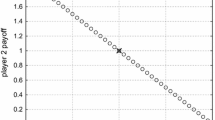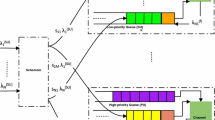Abstract
The increasing number of radio access technologies and the availability of multi-radio devices boost the need for novel resource allocation schemes in cellular networks. This paper uses a cooperative game theoretic approach for resource allocation at the network level, while utilizing simultaneous use of available radio interfaces at the device level. We model resource allocation management using the well known bankruptcy model and apply Kalai-Smorodinsky bargaining solution method to find a distribution rule, based on which we propose resource allocation and call admission control schemes. Performance analysis of our allocation and control schemes demonstrates significant improvements over previous approaches in terms of utilization of the available bandwidth and the number of call drops. We also study the performance of proposed approach for different operator policies.
Similar content being viewed by others
References
Badia, L., Taddia, C., Mazzini, G., & Zorzi, M. (2008). Multiradio resource allocation strategies for heterogeneous wireless networks. EURASIP Journal of Advanced Signal Processing.
Bazzi, A., Pasolini, G., & Andrisano, O. (2008). Multiradio resource management: parallel transmission for higher throughput? EURASIP Journal of Advanced Signal Processing.
Bosmans, K., & Lauwers, L. L. (2007). Comparisons of nine rules for the adjudication of conflicting claims. Katholieke Universiteit Leuven Centrum voor Economische, ces0705.
Das, S. K., Lin, H., & Chatterjee, M. (2004). An econometric model for resource management in competitive wireless data networks. IEEE Network, 18, 20–26.
Dimou, K., Agero, R., Bortnik, M., Karimi, R., Koudouridis, G. P., Kaminski, S., & Lederer, H. (2005). Generic link layer: a solution for multi-radio transmission diversity in communication networks beyond 3G. In Proc. IEEE 62nd vehicular technology conf. (Vol. 3, pp. 1672–1676).
draft-ietf-mext-binary-ts.
draft-ietf-mptcp-architecture-01.
Gabor, F., Anders, F., & Johan, L. (2004). On access selection techniques in always best connected networks. In ITC specialist seminar on performance evaluation of wireless and mobile systems.
Halder, N., & Song, J. B. (2007). Game theoretical analysis of radio resource management in wireless networks: a non-cooperative game approach of power control. IJCSNS International Journal of Computer Science and Network Security, 7(6), 184–192.
Kalai, E. (1983). Solutions to the bargaining problem, vol. 556. Center for mathematical studies in economics and management science.
Luo, J., Mukerjee, R., Dillinger, M., Mohyeldin, E., & Schulz, E. (2008). Investigation of radio resource scheduling in WLANs coupled with 3G cellular network. IEEE Communications Magazine, 41, 108–115.
Mariz, D., Cananea, I., Sadok, D., & Fodor, G. (2006). Simulative analysis of access selection algorithms for multi-access networks. In Proc. international symposium on a world of wireless mobile and multimedia networks WoWMoM.
Niebert, N., Schieder, A., Abramowicz, H., Malmgren, G., Sachs, J., Horn, U., & Prehofer, C. (2004). Ambient networks: an architecture for communication networks beyond 3G. IEEE Wireless Communications, 11, 14–22.
Niyato, D., & Hossain, E. (2006). Bandwidth allocation in 4G heterogeneous wireless access networks: a noncooperative game theoretical approach. In Proc. IEEE global telecom. conf. GLOBECOM (pp. 1–5).
Niyato, D., & Hossain, E. (2006). A cooperative game framework for bandwidth allocation in 4G heterogeneous wireless networks. In Proc. IEEE international conf. on communications ICC ’06 (Vol. 9, pp. 4357–4362).
Osborne, M. J., & Rubinstein, A. (2005). Bargaining and Markets. UCLA Department of Economics.
Perez-Romero, J., Sallent, O., Agusti, R., Karlsson, P., Barbaresi, A., Wang, L., Casadevall, F., Dohler, M., Gonzalez, H., & Cabral-Pinto, F. (2005). Common radio resource management: functional models and implementation requirements. In IEEE 16th personal and indoor and mobile radio communications (Vol. 3).
Pries, R., Andreas, & Staehle, D. (2006). A network architecture for a policy-based handover across heterogeneous networks. In Proceedings of OPNETWORK.
Rasmusen, E. (2006). Games and information: an introduction to game theory. New York/Oxford: Wiley/Blackwell.
Song, W., Zhuang, W., & Cheng, Y. (2007). Load balancing for cellular/WLAN integrated networks. IEEE Network, 21, 27–33.
Suliman, I. M., Pomalaza-Rez, C., Lehtomki, J., & Oppermann, I. (2004). Radio resource allocation in heterogeneous wireless networks using cooperative games. In Proc. Nordic radio, symposium 2004/finnish wireless communications workshop.
Taha, A.-E. M., Hassanein, H. S., & Mouftah, H. T. (2008). Vertical handoffs as a radio resource management tool. Computer Communications, 5, 950–961.
Tolli, A., Hakalin, P., & Holma, H. (2002). Performance evaluation of common radio resource management (CRRM). In IEEE international conference on communications (Vol. 5, pp. 3429–3433).
Vartiainen, H., & Foundation, Y. J. (2003). Bargaining without disagreement. Discussion papers.
Author information
Authors and Affiliations
Corresponding author
Rights and permissions
About this article
Cite this article
Khan, M.A., Toker, A.C., Sivrikaya, F. et al. Cooperation-based resource allocation and call admission for wireless network operators. Telecommun Syst 51, 29–41 (2012). https://doi.org/10.1007/s11235-010-9412-1
Published:
Issue Date:
DOI: https://doi.org/10.1007/s11235-010-9412-1




